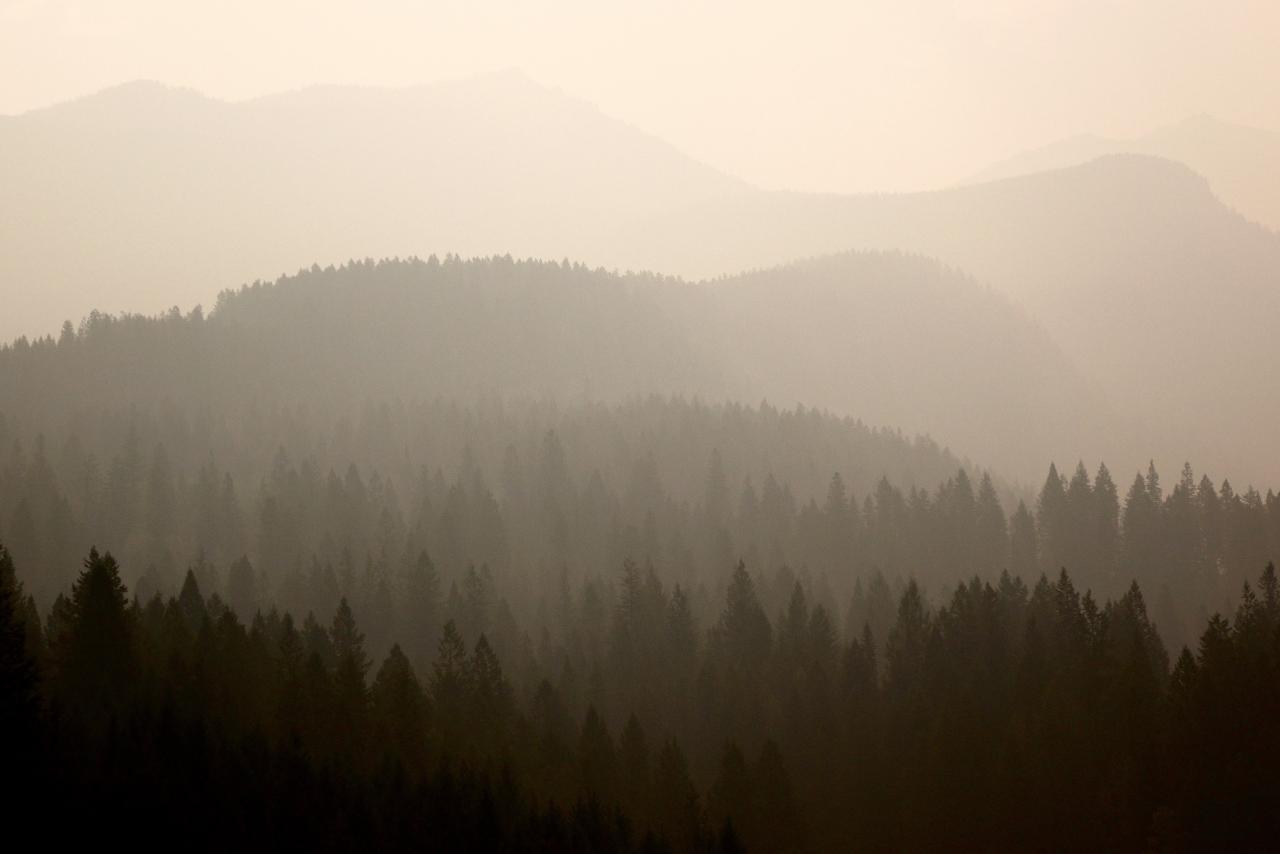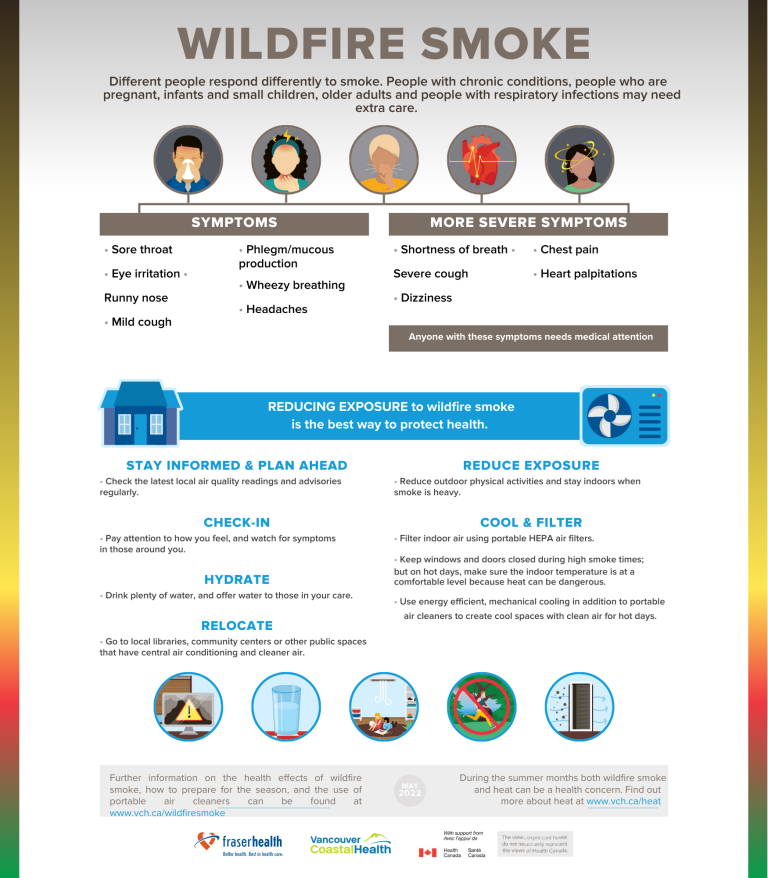Resource
Wildfire smoke

Wildfire smoke is a form of air pollution that can affect your health.
Why smoke is harmful
Smoke contains very small particles of pollution – known as particulate matter or PM – that travel deep into your lungs when you inhale. These particles can cause irritation and inflammation. Of all the pollutants in wildfire smoke, particulate matter poses the greatest risk to health. Learn more about the composition of wildfire smoke from this BCCDC fact sheet.
Most symptoms can be managed without medical attention:
- Sore throat
- Eye irritation
- Runny nose
- Mild cough
- Phlegm production
- Wheezy breathing
- Headaches
Some people may experience more severe symptoms and should seek prompt medical attention. Call HealthLink BC (8-1-1), talk to your primary care physician or visit a walk-in clinic if you're experiencing:
- Shortness of breath
- Severe cough
- Dizziness
- Chest pain
- Heart palpitations
People at higher risk
Different people respond differently to smoke, and some people are at higher risk of experiencing health effects. Reducing exposure to wildfire smoke is especially important for the following groups of people:
- People with pre-existing chronic conditions such as asthma, chronic obstructive pulmonary disease (COPD), heart disease, and diabetes
- People who are pregnant
- Infants and small children
- Elderly
- People who have been diagnosed with a respiratory infection
Other people can be affected by wildfire smoke too. Everyone responds differently, so listen to your body and reduce your exposure if the smoke is affecting you.

Read about the health effects of wildfire smoke and ways to reduce exposure.
Download the wildfire smoke posterProtect yourself from wildfire smoke
The best way to protect against the potentially harmful effects of wildfire smoke is reduce your exposure to smoke and seek cleaner air:
- Use a portable HEPA air cleaner to filter the air in one area of your home
- If a HEPA air cleaner is not available, consider making a home-made box fan air filter
- Visit public spaces such as community centres, libraries, and shopping malls which tend to have cleaner, cooler indoor air
- Limit activity and outdoor exercise on smoky days because the harder you breathe, the more smoke you inhale
- Drink lots of water to help reduce inflammation
- If you are working outdoors, use an N95 respirator that has been properly fitted by occupational health and safety professionals
-
Whenever possible, use air conditioners, heat pumps, evaporative coolers, fans, and window shades to keep your cleaner air space comfortably cool on hot days. Overheating can cause serious health problems. Learn more about heat
Find more information on the health effects of wildfire smoke, how to prepare for the season and the use of portable air cleaners for wildfire smoke on the BCCDC website.
The Air Quality Health Index tool
The Air Quality Health Index (AQHI) is a tool designed to help people understand how air quality can affect their health, and how they can protect themselves when air quality is poor. The index is based on measurements of fine particulate matter (PM2.5), ground-level ozone (O3), and nitrogen dioxide (NO2) and is reported across BC. Learn more about how the index is calculated from this BCCDC Fact Sheet.
Air quality monitoring data
PM2.5 concentrations are the best air quality measure of wildfire smoke and are reported across a number of regulatory grade sensors in BC (data map).
PM2.5 data from lower-cost air quality monitors (less reliable but still good) can be found in areas where regulatory sensors may not be available (data map).
Air quality advisories and bulletins
Watch for these air quality notifications issued in the VCH region:
Within Metro Vancouver
An air quality advisory is issued by Metro Vancouver when air quality over a large portion of Metro Vancouver and the Fraser Valley Regional District temporarily deteriorates, or is expected to deteriorate soon.
Outside of Metro Vancouver
The Smoky Skies Bulletin is issued by BC Ministry of Environment and Climate Change Strategy when areas of the province are being impacted or have reasonable potential to be impacted by wildfire smoke within 24 to 48 hours.
Learn more about the types of advisories that are issued when the air gets smoky, how to know if there is smoke in the air, and how to stay up to date on the Metro Vancouver website.
BCCDC Wildfire Smoke Website
Find more information on the health effects of wildfire smoke, how to prepare for the season and ways to protect health from wildfire smoke on the BCCDC website.
Wildfire smoke fact sheets include:
- Portable air cleaners for wildfire smoke
- Home-made box air fan filters
- Wildfire smoke and outdoor exercise
- Wildfire smoke during extreme heat events
- Face masks for wildfire smoke
- Translated wildfire smoke fact sheets
Resources
-
-
Schools and Wildfire Smoke
Vancouver Coastal Health & Fraser Health
-
Childcare facilities and wildfire smoke
Vancouver Coastal Health
-
Community care facilities and wildfire smoke
Vancouver Coastal Health
-
Pool Operators on Extreme Heat and Smoke
Fraser Health
-
-
-
Wildfires Fact Sheet: Composition of Wildfire Smoke
BCCDC
-
Wildfire smoke poster
-
Outdoor Gatherings Guidance
Vancouver Coastal Health
-

